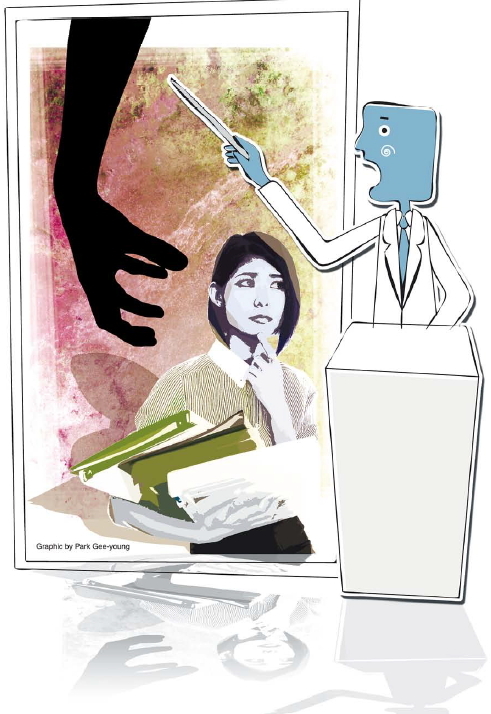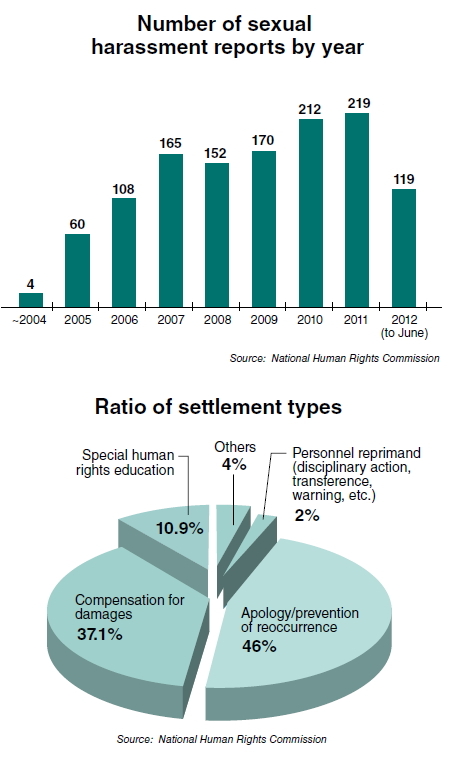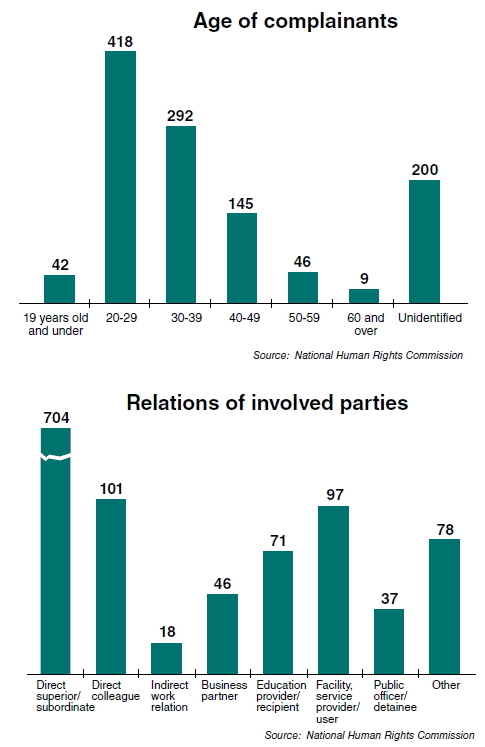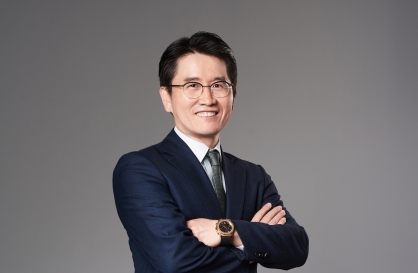Harassment education, policies lack rigor
Willingness, culture to become more gender-aware still weak
By Korea HeraldPublished : June 11, 2013 - 21:05
This is the second in a series of articles on sexual harassment in Korea: how society perceives it, what measures are being taken, and what more can be done to prevent it. ― Ed.
Every time there is a sexual harassment prevention training session at her work, Kim Sun-young, 38, is sure what her male manager will come out saying.
“Should I have to pay 30 million won for saying this?” is his usual aside after commenting on anything related to a female coworker, at which his male subordinates laugh uncomfortably.
“At some point, even the training session feels like just one more opportunity for such men to talk about anything related to women or sex,” Kim said.

Since 1999, sexual harassment prevention training sessions at workplaces have been compulsory in Korea but have long been criticized for being a mere formality.
According to the Gender Equal Employment Act, all government agencies, educational institutes and businesses are obliged to conduct such education sessions at least once a year, for more than an hour. Regardless of the number of employees and the size of the workplace, employers must conduct sexual harassment awareness training by hiring certified lecturers and check the attendance of employees. Even for non-Korean speakers, employers should provide education sessions in necessary foreign languages.
“The real problem arises among smaller companies, some of which end up showing a short video clip while some others just circulate a list to be signed and forgoing any actual learning session,” said Kim Eun-mee, head of the antidiscrimination division of the National Human Rights Commission.
“In order to raise the efficiency, the way they are checked should be improved as well. Rather than only inspecting how many attended the session, the quality of the training should also be reviewed,” Kim suggested.
At present, the Gender Equality Ministry is in charge of developing educational content, training lecturers and supervising government offices, municipalities and agencies. The Labor Ministry separately oversees the private sector and takes disciplinary action against companies if they fail to comply.

All employers disobeying the law could be fined up to a maximum of 3 million won ($2,700) and held accountable for any complaints filed to authorities. However, the businesses are not obliged to report to the government whether or not they have conducted the awareness training.
“It is technically impossible to check to see if all employers have fulfilled their responsibilities. We investigate companies that are accused of not conducting sexual harassment prevention programs or those that have sexual harassment cases reported to authorities,” an official at the Labor Ministry said.
The mandatory training has partly helped workers understand what constitutes sexual offenses and that they could be defined as serious criminal acts, said Chang Yun-kyong, director of the Conflict Management Institute.
“In the beginning, many male workers refused to attend lectures because they hated to be viewed as potential perpetuators at workplaces. But things are different now. Many workers are more open and pay more attention to the subject,” said Chang, who has lectured on sexual harassment for nearly 20 years.
However, such institutional changes have not yet succeeded to change the existing social perception that has tolerated sexual harassment at workplaces.
“People understand, in theory, that certain behavior can sexually humiliate others. But it will take a long time for many to fully accept that even calling someone ‘ajumma’ (married lady) can amount to sexual harassment,” she said.
The word ajumma, if used by male employees when addressing female coworkers, can be regarded as sexual harassment by specifying one’s gender in a degrading way.
Not only offenders but also victims in lower positions at workplaces usually find it hard to raise the issue in public because they were culturally educated not to criticize seniors, she added.
Chang also urged both the government and employers to hold more lectures for smaller groups of workers, rather than making it a one-time event for all employees each year.
“It is important to offer them a chance to discuss the issue and better interact with each participant,” she said.
In particular, the employers must hold a separate training session for senior-level employees because they hold more authority to change companies’ direction on sexual harassment.
Starting education at an early age would help, according to Park Seon-young, chief of Center for Human Rights Policy at the Korean Women’s Development Institute.
“Children must start receiving education on gender-sensitive perceptions from middle and high school. Trying to educate them only after they enter their workplace and attempting to change their perception is not easy,” she said.
The Ministry of Education, from this year, increased the hours for sex education at elementary, middle and high schools from 10 hours to 15 hours. But critics say that education from a gender-sensitive perspective should be reflected in the overall sex education program.

Gender policies
The need for a fundamental approach to see meaningful progress in gender-related conflict is also evident in gender-equality policies.
Last week, the government announced a measure under which full-time working mothers could request companies to reduce their work hours for a year, while mothers with kids aged 9 and under would be permitted to take partly paid maternity leave for a year. The limit is currently for kids up to age 6. The government also said it plans to create about 930,000 part-time jobs, especially for women, with better child care services and flexible working hours for mothers.
Critics said while such measures may be helpful in the short term, it may be barking up the wrong tree in the long run, such as by narrowing down the advance of women workers into certain jobs, and leaving the child care burden solely up to mothers.
“Excessively increasing part-time jobs can only increase the number of low-quality and low-paid jobs. (The measures) are extremely insufficient in that they are void of solutions to help part-time and irregular workers currently facing discrimination,” the Federation of Korea Trade Unions said.
Kim Na-hyoun agreed.
“The reason why women workers cannot properly use maternity leave is because of the negative perception from their colleagues and bosses. This does not help alleviate companies’ avoidance of hiring women for such reasons.”
Various statistics show that the burden of child care still falls disproportionately on women.
About 310,000 women are said to leave the workforce each year, with over half of them citing child-rearing as the reason.
On the other hand, the actual number of workers taking advantage of paternity leave is low at private companies, with the Labor Ministry’s survey showing that of the 64,069 employees that applied for child care leave last year, only 1,790 were men, a 27.6 percent increase from the year before, but still only 3 percent of the total.
“It would have been more desirable if the policy was aimed to encourage more men to actively use leave to take care of their children,” Kim Na-hyoun said.
On that note, Kim Eun-mee of the NHRC underscored that no matter how good a policy is, it is useless if the businesses do not follow it.
“While there is an extensive range of policies pushed by the government to eliminate gender discrimination, the problem lies in businesses hesitant to follow them. CEOs or heads of organizations must change their perceptions and take the gender matter seriously,” Kim said.
The Park Geun-hye government has devised scores of gender equality policies, including measures to enable more men to take part in raising children by increasing paid leave allowance after childbirth from five to 30 days, or increasing the 9 percent of manager-level female public servants to 15 percent by 2017. Such policies, however, also face hurdles such as differences between ministries on how to finance the projects.
The substandard condition of women’s polices was candidly underscored by Gender Equality and Family Minister Cho Yoon-sun while she attended an OECD forum in Paris, France, on May 29.
“The Republic of Korea has 18 central ministries. One of them is the Gender Equality Ministry and 17 are ‘male’ ministries,” she was quoted as saying.
She pointed out that social willingness or culture to consider how each policy will affect each gender is still low.
As an example, Cho cited how only 3 percent of the entire budget was set aside for gender-sensitive issues due to lack of cooperation among ministries. A gender-sensitive budget refers to appropriation and distribution of budgets according to their impact on women and men.
Cho could not have described it better when she added, “While a crack has been made with the emergence of a female president, the (glass) ceiling is far from broken.”
By Lee Joo-hee and Cho Chung-un
(jhl@heraldcorp.com), (christory@heraldcorp.com)
Every time there is a sexual harassment prevention training session at her work, Kim Sun-young, 38, is sure what her male manager will come out saying.
“Should I have to pay 30 million won for saying this?” is his usual aside after commenting on anything related to a female coworker, at which his male subordinates laugh uncomfortably.
“At some point, even the training session feels like just one more opportunity for such men to talk about anything related to women or sex,” Kim said.

Since 1999, sexual harassment prevention training sessions at workplaces have been compulsory in Korea but have long been criticized for being a mere formality.
According to the Gender Equal Employment Act, all government agencies, educational institutes and businesses are obliged to conduct such education sessions at least once a year, for more than an hour. Regardless of the number of employees and the size of the workplace, employers must conduct sexual harassment awareness training by hiring certified lecturers and check the attendance of employees. Even for non-Korean speakers, employers should provide education sessions in necessary foreign languages.
“The real problem arises among smaller companies, some of which end up showing a short video clip while some others just circulate a list to be signed and forgoing any actual learning session,” said Kim Eun-mee, head of the antidiscrimination division of the National Human Rights Commission.
“In order to raise the efficiency, the way they are checked should be improved as well. Rather than only inspecting how many attended the session, the quality of the training should also be reviewed,” Kim suggested.
At present, the Gender Equality Ministry is in charge of developing educational content, training lecturers and supervising government offices, municipalities and agencies. The Labor Ministry separately oversees the private sector and takes disciplinary action against companies if they fail to comply.

All employers disobeying the law could be fined up to a maximum of 3 million won ($2,700) and held accountable for any complaints filed to authorities. However, the businesses are not obliged to report to the government whether or not they have conducted the awareness training.
“It is technically impossible to check to see if all employers have fulfilled their responsibilities. We investigate companies that are accused of not conducting sexual harassment prevention programs or those that have sexual harassment cases reported to authorities,” an official at the Labor Ministry said.
The mandatory training has partly helped workers understand what constitutes sexual offenses and that they could be defined as serious criminal acts, said Chang Yun-kyong, director of the Conflict Management Institute.
“In the beginning, many male workers refused to attend lectures because they hated to be viewed as potential perpetuators at workplaces. But things are different now. Many workers are more open and pay more attention to the subject,” said Chang, who has lectured on sexual harassment for nearly 20 years.
However, such institutional changes have not yet succeeded to change the existing social perception that has tolerated sexual harassment at workplaces.
“People understand, in theory, that certain behavior can sexually humiliate others. But it will take a long time for many to fully accept that even calling someone ‘ajumma’ (married lady) can amount to sexual harassment,” she said.
The word ajumma, if used by male employees when addressing female coworkers, can be regarded as sexual harassment by specifying one’s gender in a degrading way.
Not only offenders but also victims in lower positions at workplaces usually find it hard to raise the issue in public because they were culturally educated not to criticize seniors, she added.
Chang also urged both the government and employers to hold more lectures for smaller groups of workers, rather than making it a one-time event for all employees each year.
“It is important to offer them a chance to discuss the issue and better interact with each participant,” she said.
In particular, the employers must hold a separate training session for senior-level employees because they hold more authority to change companies’ direction on sexual harassment.
Starting education at an early age would help, according to Park Seon-young, chief of Center for Human Rights Policy at the Korean Women’s Development Institute.
“Children must start receiving education on gender-sensitive perceptions from middle and high school. Trying to educate them only after they enter their workplace and attempting to change their perception is not easy,” she said.
The Ministry of Education, from this year, increased the hours for sex education at elementary, middle and high schools from 10 hours to 15 hours. But critics say that education from a gender-sensitive perspective should be reflected in the overall sex education program.

Gender policies
The need for a fundamental approach to see meaningful progress in gender-related conflict is also evident in gender-equality policies.
Last week, the government announced a measure under which full-time working mothers could request companies to reduce their work hours for a year, while mothers with kids aged 9 and under would be permitted to take partly paid maternity leave for a year. The limit is currently for kids up to age 6. The government also said it plans to create about 930,000 part-time jobs, especially for women, with better child care services and flexible working hours for mothers.
Critics said while such measures may be helpful in the short term, it may be barking up the wrong tree in the long run, such as by narrowing down the advance of women workers into certain jobs, and leaving the child care burden solely up to mothers.
“Excessively increasing part-time jobs can only increase the number of low-quality and low-paid jobs. (The measures) are extremely insufficient in that they are void of solutions to help part-time and irregular workers currently facing discrimination,” the Federation of Korea Trade Unions said.
Kim Na-hyoun agreed.
“The reason why women workers cannot properly use maternity leave is because of the negative perception from their colleagues and bosses. This does not help alleviate companies’ avoidance of hiring women for such reasons.”
Various statistics show that the burden of child care still falls disproportionately on women.
About 310,000 women are said to leave the workforce each year, with over half of them citing child-rearing as the reason.
On the other hand, the actual number of workers taking advantage of paternity leave is low at private companies, with the Labor Ministry’s survey showing that of the 64,069 employees that applied for child care leave last year, only 1,790 were men, a 27.6 percent increase from the year before, but still only 3 percent of the total.
“It would have been more desirable if the policy was aimed to encourage more men to actively use leave to take care of their children,” Kim Na-hyoun said.
On that note, Kim Eun-mee of the NHRC underscored that no matter how good a policy is, it is useless if the businesses do not follow it.
“While there is an extensive range of policies pushed by the government to eliminate gender discrimination, the problem lies in businesses hesitant to follow them. CEOs or heads of organizations must change their perceptions and take the gender matter seriously,” Kim said.
The Park Geun-hye government has devised scores of gender equality policies, including measures to enable more men to take part in raising children by increasing paid leave allowance after childbirth from five to 30 days, or increasing the 9 percent of manager-level female public servants to 15 percent by 2017. Such policies, however, also face hurdles such as differences between ministries on how to finance the projects.
The substandard condition of women’s polices was candidly underscored by Gender Equality and Family Minister Cho Yoon-sun while she attended an OECD forum in Paris, France, on May 29.
“The Republic of Korea has 18 central ministries. One of them is the Gender Equality Ministry and 17 are ‘male’ ministries,” she was quoted as saying.
She pointed out that social willingness or culture to consider how each policy will affect each gender is still low.
As an example, Cho cited how only 3 percent of the entire budget was set aside for gender-sensitive issues due to lack of cooperation among ministries. A gender-sensitive budget refers to appropriation and distribution of budgets according to their impact on women and men.
Cho could not have described it better when she added, “While a crack has been made with the emergence of a female president, the (glass) ceiling is far from broken.”
By Lee Joo-hee and Cho Chung-un
(jhl@heraldcorp.com), (christory@heraldcorp.com)
-
Articles by Korea Herald





![[Weekender] How DDP emerged as an icon of Seoul](http://res.heraldm.com/phpwas/restmb_idxmake.php?idx=644&simg=/content/image/2024/04/25/20240425050915_0.jpg&u=)
![[Herald Interview] Guggenheim Museum makes a push for technology-based art with LG](http://res.heraldm.com/phpwas/restmb_idxmake.php?idx=644&simg=/content/image/2024/04/26/20240426050608_0.jpg&u=20240428114717)




![[Music in drama] An ode to childhood trauma](http://res.heraldm.com/phpwas/restmb_idxmake.php?idx=644&simg=/content/image/2024/04/25/20240425050929_0.jpg&u=)






![[Herald Interview] Mistakes turn into blessings in street performance, director says](http://res.heraldm.com/phpwas/restmb_idxmake.php?idx=652&simg=/content/image/2024/04/28/20240428050150_0.jpg&u=20240428174656)
